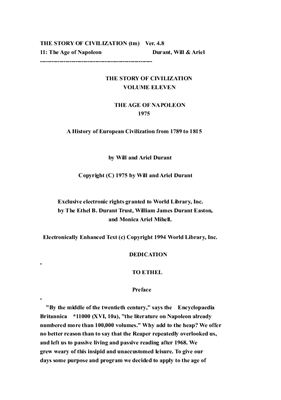MJF Books, 1997. - 1115 p.
ISBN-10: 1567310222
"By the middle of the twentieth century," says the Encyclopaedia Britannica *11000 (XVI, 10a), "the literature on Napoleon already numbered more than 100,000 volumes." Why add to the heap? We offer no better reason than to say that the Reaper repeatedly overlooked us, and left us to passive living and passive reading after 1968. We grew weary of this insipid and unaccustomed leisure. To give our days some purpose and program we decided to apply to the age of Napoleon (1789-1815) our favorite method of integral historyweaving into one narrative all memorable aspects of European civilization in those twenty-seven years: statesmanship, war,
economics, morals, manners, religion, science, medicine, philosophy, literature, drama, music, and art; to see them all as elements in one moving picture, and as interacting parts of a united whole. We would see Prime Minister William Pitt ordering the arrest of author Tom Paine; chemist Lavoisier and mystic Charlotte Corday mounting the guillotine; Admiral Nelson taking Lady Hamilton as his mistress; Goethe foreseeing a century of events from the battle of Valmy; Wordsworth enthusing over the French Revolution, Byron over the Greek; Shelley teaching atheism to Oxford bishops and dons; Napoleon fighting kings and imprisoning a pope, teasing physicians and philosophers, taking half a hundred scholars and scientists to conquer or reveal Egypt, losing Beethoven's dedication to the Eroica for an empire, talking drama with Talma, painting with David, sculpture with Canova, history with Wieland, literature with Goethe, and fighting a fifteen-year war with the pregnable but indomitable Mme. de Stael. This vision roused us from our septua-octo-genarian lassitude to a reckless resolve to tu our amateur scholarship to picturing that exciting and eventful age as a living whole. And shall we confess it?- we had nurtured from our adolescence a sly, fond interest in Napoleon as no mere warmonger and despot, but as also a philosopher seldom deceived by pretense, and as a psychologist who had ceaselessly studied human nature in the mass and in individual men. One of us was rash enough to give ten lectures on Napoleon in 1921. For sixty years we have been gathering material about him, so that some of our references will be to books once helpful and now dead.
ISBN-10: 1567310222
"By the middle of the twentieth century," says the Encyclopaedia Britannica *11000 (XVI, 10a), "the literature on Napoleon already numbered more than 100,000 volumes." Why add to the heap? We offer no better reason than to say that the Reaper repeatedly overlooked us, and left us to passive living and passive reading after 1968. We grew weary of this insipid and unaccustomed leisure. To give our days some purpose and program we decided to apply to the age of Napoleon (1789-1815) our favorite method of integral historyweaving into one narrative all memorable aspects of European civilization in those twenty-seven years: statesmanship, war,
economics, morals, manners, religion, science, medicine, philosophy, literature, drama, music, and art; to see them all as elements in one moving picture, and as interacting parts of a united whole. We would see Prime Minister William Pitt ordering the arrest of author Tom Paine; chemist Lavoisier and mystic Charlotte Corday mounting the guillotine; Admiral Nelson taking Lady Hamilton as his mistress; Goethe foreseeing a century of events from the battle of Valmy; Wordsworth enthusing over the French Revolution, Byron over the Greek; Shelley teaching atheism to Oxford bishops and dons; Napoleon fighting kings and imprisoning a pope, teasing physicians and philosophers, taking half a hundred scholars and scientists to conquer or reveal Egypt, losing Beethoven's dedication to the Eroica for an empire, talking drama with Talma, painting with David, sculpture with Canova, history with Wieland, literature with Goethe, and fighting a fifteen-year war with the pregnable but indomitable Mme. de Stael. This vision roused us from our septua-octo-genarian lassitude to a reckless resolve to tu our amateur scholarship to picturing that exciting and eventful age as a living whole. And shall we confess it?- we had nurtured from our adolescence a sly, fond interest in Napoleon as no mere warmonger and despot, but as also a philosopher seldom deceived by pretense, and as a psychologist who had ceaselessly studied human nature in the mass and in individual men. One of us was rash enough to give ten lectures on Napoleon in 1921. For sixty years we have been gathering material about him, so that some of our references will be to books once helpful and now dead.

